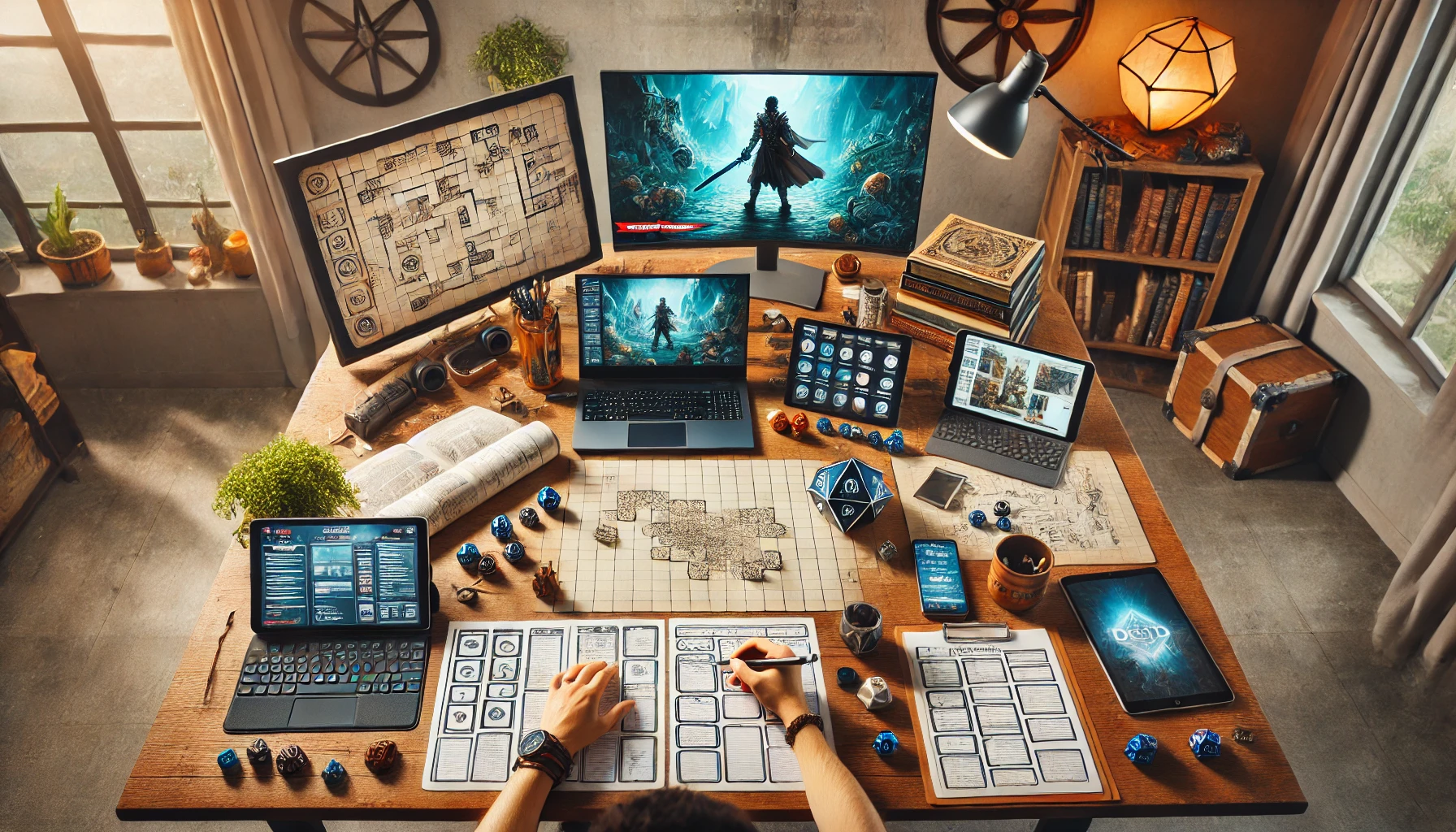Dungeon Master Dispatch
Session Prep Efficiency: Maximizing Your Prep Time
Part 3

Post-Session Review and Adjustment
In the last post, we went over ways to quickly generate NPCs and locations. In this post, we will talk about the post-Game prep, and how to streamline it better.
Reflecting on your sessions and making adjustments based on player feedback is crucial for continuous improvement as a Dungeon Master. This process helps you identify what works well, what needs refinement, and how to better prepare for future sessions. Here’s how to conduct an effective post-session review and adjustment:
Reviewing the Session:
Session Recap:
Summary of Events: Write a brief summary of the session’s events immediately after it ends. This recap should include major plot developments, key encounters, and significant player actions.
Example: "In this session, the party negotiated an alliance with the Elven Queen, uncovered a hidden temple in the forest, and thwarted an ambush by bandits."
Player Choices: Note any important decisions made by the players that could have long-term implications for the campaign.
Example: "The players chose to spare the bandit leader, who promised to reform and may become a recurring NPC."
Player Feedback:
Group Discussion: After the session, hold a brief discussion with your players to gather their immediate thoughts and feelings. Ask them what they enjoyed, what they found challenging, and any suggestions they might have.
Example: "What did you all think of the negotiation with the Elven Queen? Was the combat encounter balanced and engaging?"
Anonymous Surveys: Occasionally use anonymous surveys to gather more candid and detailed feedback. This can help you identify areas for improvement that players might be hesitant to discuss openly.
Example: Create a survey with questions like, "Rate the enjoyment of this session on a scale of 1 to 10," and "What aspects of the session could be improved?"
Adjusting Future Prep:
Identifying Strengths and Weaknesses:
Analyze Feedback: Review the feedback you’ve gathered to identify patterns. Look for consistent strengths to build on and weaknesses to address.
Example: If multiple players mention that they enjoyed the role-playing opportunities but found the combat encounters too difficult, consider adjusting future encounters accordingly.
Reflect on Your Performance: Take some time to reflect on your own performance as a DM. Consider what you felt went well and what could be improved.
Example: "I felt the pacing was good during the role-playing scenes, but I need to work on managing combat more smoothly."
Adjusting Encounter Design:
Balancing Encounters: Use player feedback to adjust the difficulty and complexity of future encounters. Ensure that combat is challenging but fair, and that role-playing and exploration encounters are engaging and meaningful.
Example: If players found a recent combat encounter too easy, consider increasing the difficulty of future encounters by adding more enemies or introducing environmental hazards.
Enhancing Role-Playing Opportunities: Based on player feedback, provide more or fewer role-playing opportunities to match their preferences.
Example: If players enjoyed interacting with NPCs, introduce more social encounters and develop deeper character backstories for NPCs they frequently interact with.
Refining Story Elements:
Plot Adjustments: Modify the storyline based on player actions and feedback. Ensure that the story remains coherent and engaging, and that player choices have meaningful consequences.
Example: If players decide to ally with a faction you hadn’t anticipated, integrate this new alliance into the main plot and explore its ramifications.
Character Development: Incorporate feedback to better align character arcs with player expectations. Provide opportunities for personal growth and development that resonate with the players.
Example: If a player expressed interest in exploring their character’s backstory, plan future sessions that delve into their past and reveal new facets of their character.
Continuous Improvement:
Iterative Process: View each session as part of an ongoing learning process. Continuously refine your prep methods and DMing style based on feedback and experience.
Example: Experiment with different encounter styles, pacing techniques, and narrative elements to see what works best for your group.
Staying Flexible: Remain open to change and be willing to adapt your plans based on how the campaign evolves. Flexibility is key to maintaining an engaging and dynamic game.
Example: If an unexpected player decision takes the story in a new direction, embrace it and adjust your prep accordingly to keep the game flowing smoothly.
By conducting thorough post-session reviews and making adjustments based on feedback, you can enhance the quality of your sessions and continuously improve as a Dungeon Master. This iterative process not only helps you address any issues that arise but also ensures that your players remain engaged and invested in the campaign.

Time Management Techniques
Effective time management is crucial for maximizing your session prep efficiency. By managing your time wisely, you can reduce stress, avoid last-minute rushes, and ensure that you are fully prepared for each session. Here are some techniques to help you manage your prep time more effectively:
Dedicated Prep Time:
Scheduling Prep Sessions:
Consistent Schedule: Set aside specific times each week for session prep. Consistency helps you develop a routine and ensures that you allocate enough time for preparation.
Example: Dedicate Tuesday and Thursday evenings to session prep, allowing you to spread out the work and avoid cramming the night before.
Time Blocks: Use time blocking to divide your prep time into focused, manageable segments. Allocate specific blocks of time for different tasks such as encounter design, NPC creation, and note organization.
Example: Spend one hour on Tuesday focusing on encounter design and another hour on Thursday working on NPCs and locations.
Breaking Prep into Manageable Chunks:
Task Segmentation: Break down your prep tasks into smaller, more manageable chunks. This approach makes the work less overwhelming and helps you maintain focus.
Example: Instead of trying to prepare an entire session in one sitting, focus on completing one or two key elements at a time, such as designing a major encounter or developing an important NPC.
Prioritize Tasks: Prioritize your tasks based on their importance and urgency. Focus on essential elements first, and tackle less critical tasks as time allows.
Example: Prioritize preparing the main plot points and critical encounters first, and leave optional side quests or minor NPC details for later if you have extra time.
Avoiding Over-Preparation:
Focus on What’s Necessary:
Essential Elements: Concentrate on preparing the elements that are most crucial for the next session. Avoid spending too much time on details that may not come into play.
Example: If the upcoming session focuses on a specific dungeon, prioritize mapping out the dungeon, detailing key encounters, and preparing relevant NPCs rather than over-preparing distant future events.
Flexible Preparation: Prepare flexible content that can be easily adapted to different situations. This approach allows you to be ready for unexpected player actions without over-preparing.
Example: Have a few generic encounters, random NPCs, and location descriptions on hand that you can quickly modify to fit the current session’s needs.
Avoid Perfectionism:
Good Enough: Aim for “good enough” rather than perfection. Understand that not every detail needs to be meticulously planned. Focus on the big picture and be ready to improvise.
Example: Instead of perfecting every dialogue line for an NPC, outline their key traits and motivations, and improvise the rest based on player interactions.
Embrace Flexibility: Be prepared to adapt and go with the flow during the session. Trust your ability to improvise and handle unexpected situations as they arise.
Example: If players take the story in an unplanned direction, use your prepared flexible content and improvisation skills to keep the session engaging.
Maximizing Efficiency:
Using Timers:
Pomodoro Technique: Use the Pomodoro Technique to enhance focus and productivity. Work in 25-minute intervals (Pomodoros) with 5-minute breaks in between. After four Pomodoros, take a longer break.
Example: Set a timer for 25 minutes and focus solely on designing encounters. After the timer goes off, take a 5-minute break before starting the next task.
Time Limits: Set time limits for specific tasks to prevent spending too much time on any one aspect of prep. This helps you stay on track and complete all necessary tasks.
Example: Allocate 30 minutes for creating NPCs and stick to that limit, even if it means leaving some details for later.
Leveraging Technology:
Digital Tools: Utilize digital tools and apps designed for D&D preparation to streamline your workflow. Tools like D&D Beyond, Roll20, and Dungeon Master Tools can help you organize your notes, create encounters, and manage characters efficiently.
Example: Use Dungeon Master Tools to quickly create and manage NPCs, and Roll20 to design detailed maps.
Automation: Automate repetitive tasks where possible. Use templates, random generators, and pre-made resources to save time and reduce manual work.
Example: Use a random NPC generator to create background characters or a combat encounter generator to quickly design balanced battles.
Staying Organized:
Centralized Note System:
Single Source of Truth: Maintain a centralized note system where all your session prep materials are stored and organized. This makes it easier to find and update information.
Example: Use a digital note-taking app like OneNote or Evernote to create a campaign notebook with sections for sessions, NPCs, locations, and encounters.
Consistent Updates: Regularly update your notes to reflect changes and new developments in your campaign. Consistent organization ensures that you always have the latest information at your fingertips.
Example: After each session, spend a few minutes updating your notes with any new information or changes that occurred.
Checklists and Templates:
Preparation Checklists: Use checklists to ensure you cover all necessary aspects of session prep. A checklist can help you stay on track and avoid missing important details.
Example: Create a prep checklist that includes tasks like "Review plot points," "Prepare encounters," "Update NPCs," and "Organize maps."
Reusable Templates: Develop reusable templates for common prep tasks, such as encounter design, NPC creation, and location descriptions. Templates save time and ensure consistency.
Example: Have a template for encounter design that includes fields for enemy stats, terrain features, and tactical notes.
By implementing these time management techniques, you can streamline your session prep process, reduce stress, and ensure that you are well-prepared for each game. Effective time management not only enhances your efficiency but also allows you to focus more on creating engaging and memorable experiences for your players.

In Conclusion
This has been a long (3 weeks) series of posts. I thought about not going into so much detail, but I figured that by breaking the topic up into three more manageable posts, I could go into as much detail as I needed, and still make it easy to read. Hopefully it’s worked.
Efficient session preparation is the key to running smooth, engaging, and memorable Dungeons & Dragons sessions. By focusing on strategies that maximize your prep time, you can reduce stress, increase your confidence, and create a richer experience for your players. Let’s recap the key points covered in this guide to help you streamline your session prep process:
Setting Clear Goals:
Defining your session objectives and prioritizing tasks helps you focus on what’s most important, ensuring that your sessions are well-structured and purposeful.
Utilizing Prep Tools and Resources:
Leveraging digital tools, templates, and online communities can save time and enhance the quality of your preparation. Tools like D&D Beyond, Roll20, and World Anvil are invaluable resources for any Dungeon Master.
Efficient Encounter Design:
Creating balanced and engaging encounters, using pre-made resources, and adopting modular designs can streamline the process and ensure a variety of exciting challenges for your players.
Streamlining NPC and Location Creation:
Using random generators, pre-made resources, and efficient templates allows you to create compelling NPCs and locations quickly, keeping your world vibrant and immersive.
Organizing Session Notes:
Effective note-taking and organization techniques ensure that you can quickly find and reference important information during your sessions, enhancing your ability to respond dynamically to player actions.
Involving Players in Prep:
Encouraging player contributions and collaboration not only enriches the campaign but also reduces your workload, fostering a sense of shared ownership and investment in the story.
Post-Session Review and Adjustment:
Conducting thorough reviews and making adjustments based on player feedback helps you continuously improve as a Dungeon Master and ensures that your sessions remain engaging and balanced.
Time Management Techniques:
Implementing effective time management strategies, such as scheduling prep sessions, breaking tasks into manageable chunks, and avoiding over-preparation, allows you to maximize your efficiency and maintain a healthy work-life balance.
By adopting these strategies, you can make your session prep process more efficient and enjoyable. Remember, the goal is not to prepare every detail meticulously but to focus on the essential elements that will make your sessions engaging and memorable. Flexibility and adaptability are your allies, and the ability to improvise will serve you well in creating a dynamic and responsive game.
Final Tips:
Stay Organized: Keep your notes and materials organized, whether digitally or physically, to ensure easy access and quick updates.
Seek Feedback: Regularly seek feedback from your players to understand what they enjoy and what can be improved. Use this feedback to refine your prep process and enhance the campaign.
Enjoy the Process: Remember that session prep is part of the fun of being a Dungeon Master. Embrace the creative process, and don’t be afraid to experiment with new techniques and ideas.
Efficient preparation not only benefits you as a DM but also creates a more immersive and enjoyable experience for your players. By streamlining your prep time, you can focus on what truly matters—crafting unforgettable adventures and fostering a shared sense of wonder and excitement at your gaming table.
Leave a Reply
Dungeon Master Dispatch
1 Response to "Session Prep Efficiency: Maximizing Your Prep Time – Part 3"
[…] the next post, we'll go into how to streamline yourPost Session […]